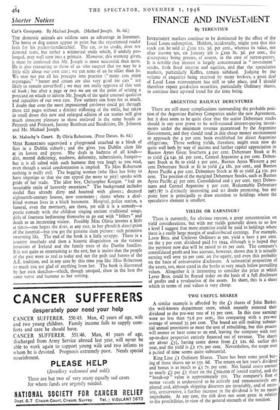FINANCE AND INVESTMENT
By TERENTIUS
INVESTMENT markets continue to be dominated by the effect of the Local Loans redemption. Holders, incidentally, might note that this stock can be sold at £too HS. 3d. per cent., whereas its value, net after income tax, on January 5th is kioo 8s. 3d. per cent., the discrepancy being greater, of course, in the case of surtax-payers. It is notable that interest is largely concentrated in " investment " stocks, both fixed interest and equities, and that the speculative markets, particularly Kaffirs, remain subdued. Judging by the volume of enquiries being received by many brokers, a great deal of Local Loan reinvestment has still to take place, and I should therefore expect good-class securities, particularly Ordinary shares, to continue their upward trend for the time being.
ARGENTINE RAILWAY DEBENTURES There are still many complications surrounding the probable posi- tion of the Argentine Railway Companies under the new Agreement, but it does seem to be quite clear that the senior Debenture stocks should in any case prove to be well-secured interest-paying invest- ments under the minimum revenue guaranteed by the Argentine Government, and they should tend in this cheap money environment to approach the 4 per cent. basis established for direct Argentine obligations. Those seeking yields, therefore, might even now do quite well both by way of income and further capital appreciation in Buenos Ayres Great Southern 4 per cent. Debenture Stock at 85 to yield £4 14s. 3d. per cent., Central Argentine 4 per cent. Deben- ture Stock at 8o to yield 5 per cent., Buenos Ayres Western 4 per cent Debenture Stock at 81 to yield £4 18s. per cent., and Buenos Ayres Pacific 4 per cent. Debenture Stock at 86 to yield £4 13s. per cent. The position of the marginal Debenture Stocks, such as Buenos Ayres Pacific 4-1- per cent. Consolidated and 5 per cent. 1912 Deben- tures and Central Argentine 5 per cent. Redeemable Debenture 1967/87 is distinctly interesting and no doubt promising, but my point here is principally to draw attention to holdings where the speculative element is smallest.
YIELDS OR EARNINGS ?
There is currently, for obvious reasons, a great concentration on yield considerations, but with net yields generally down to so low a level I suggest that more attention could be paid to holdings where there is a really large margin of undistributed earnings. For example, Lever Bros. and Unilever Ordinary at 5os. yield a bare 2 per cent. on the 5 per cent. dividend paid for 1944, although it is hoped that the payment now due will be raised to to per cent. The company's consolidated profit and loss account, however, shows that it is actually earning well over so per cent. on the equity, and even this probably on the basis of conservative disclosure. A substantial proportion of the assets, too, must stand in the books at very much below prevailing values. Altogether it is interesting to consider the price at which Lever Bros. could be floated today on the basis of a full disclosure of profits and a revaluation of the assets. In short, this is a share which in terms of real values is very cheap.
TWO USEFUL SHARES
A similar example is afforded by the Li shares of John Barker, the well-known department store, which recently restored their dividend to the pre-war rate of 15 per cent. In this case earnings were no less than 75.6 per cent., this comparing with a pre-war average of around 35 per cent. The board are still making substan- tial annual provisions to meet the cost of rebuilding, but this process will sooner or later come to an end, leaving the company with very up-to-date properties entirely financed out of revenue. The shares are about £5+, having come down from £5 12S. 6d. earlier this year, and the yield is £2 17s. per cent. Nevertheless, the scope over a period of time seems quite substantial.
King Line Li Ordinary Shares. There has been some good buy- ing of these shares up to 55s. 6d. The return on last year's dividend and bonus is as much as £5 7s. per cent. Net liquid assets amount to nearly £2 per £t share on the £500,000 of issued capital, and the " break-up " value is approximately 5ts. The company's fleet of motor vessels is understood to be actively and remuneratively em- ployed and, although shipping directors are invariably, and of neces- sity, conservative, a further increase in the dividend is by no means improbable. At any rate, the risk does not seem great in relation to the possibilities, in view of the general strength of the position.


































 Previous page
Previous page